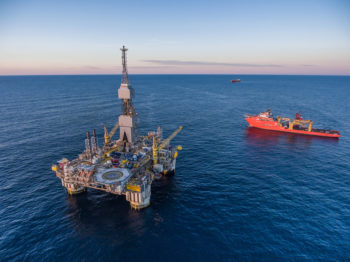
Norway is seeking greater leeway to restrict foreign ownership of its offshore fields, a move seen to be potentially targeting a growing Russian interest in its resources.
In recent proposed changes to industry regulations, the Norwegian government beefed up its possibility to reject non-European entities on grounds of national security from acquiring offshore oil and gas licenses.
“I would interpret this as a wish to establish a safer legal basis to impose restrictions on foreign ownership,” Ivar Alvik, a law professor at the University of Oslo, said in a phone interview.
Norway is grappling with accelerating changes in ownership of its oil industry, which is under pressure from the collapse in crude prices, a shift to renewable energy and dwindling resources. BP Plc and Exxon Mobil Corp. have relinquished their role as operators in Norway and big utilities such as RWE AG have sold their local oil and gas businesses. Smaller, more specialized companies, often backed by private equity, are picking up the pieces and Russian companies are among those seeking to move in.
The changing make-up is creating concerns about the financial strength of the newcomers and spurring questions about more strategic issues, such as protecting Norway’s natural-gas system, according to Arild Moe, a senior research fellow at the Fridtjof Nansen Institute in Oslo.
“It’s infrastructure of a high strategic value,” he said. “It touches on very strong economic interests, both in terms of access and knowledge about how it works.”
The Norwegian Petroleum and Energy Ministry said the change puts the country more in line with the rest of Europe. The national security provision exists in a European directive, but Norway didn’t include this clause when it implemented the text in national law in the 1990s. Norway isn’t a member of the European Union, but adopts significant chunks of EU legislation because it participates in the single market through the European Economic Area agreement.
While the new provision could be regarded as a “precautionary measure,” Russian companies’ involvement in Norway has been “high on the agenda” at a time of deeper tension between the government of Vladimir Putin and western Europe over the conflict in Ukraine, Moe said.
Norway approved Russian billionaire Mikhail Fridman’s bid to acquire RWE’s assets in 2014, a transaction the U.K. rejected on its territory, citing the risk of escalating sanctions. State-controlled Rosneft PJSC and Lukoil PJSC are already partners in licenses in Norway’s Arctic, where exploration is accelerating after a border agreement between the two countries. Norway is also facing the potential entry of Gazprom PJSC, which agreed last year to acquire 38.5 percent of OMV AG’s local subsidiary.
Norway has been keen to keep up contact with Russia — its neighbor in the Arctic — even after sanctions were imposed following the 2014 annexation of Crimea. Statoil ASA, Norway’s state-controlled crude producer, also does business in Russia and has a strategic partnership with Rosneft.
Norway has yet to receive an application for the Gazprom-OMV transaction, ministry spokeswoman Ella Bye Morland said by email. She declined to comment on a Reuters report last year that Norway was seeking to lower Gazprom’s stake to a maximum of 25 percent.
The ministry sent its regulation proposal to oil companies and other ministries in a consultation process that will close on June 13.